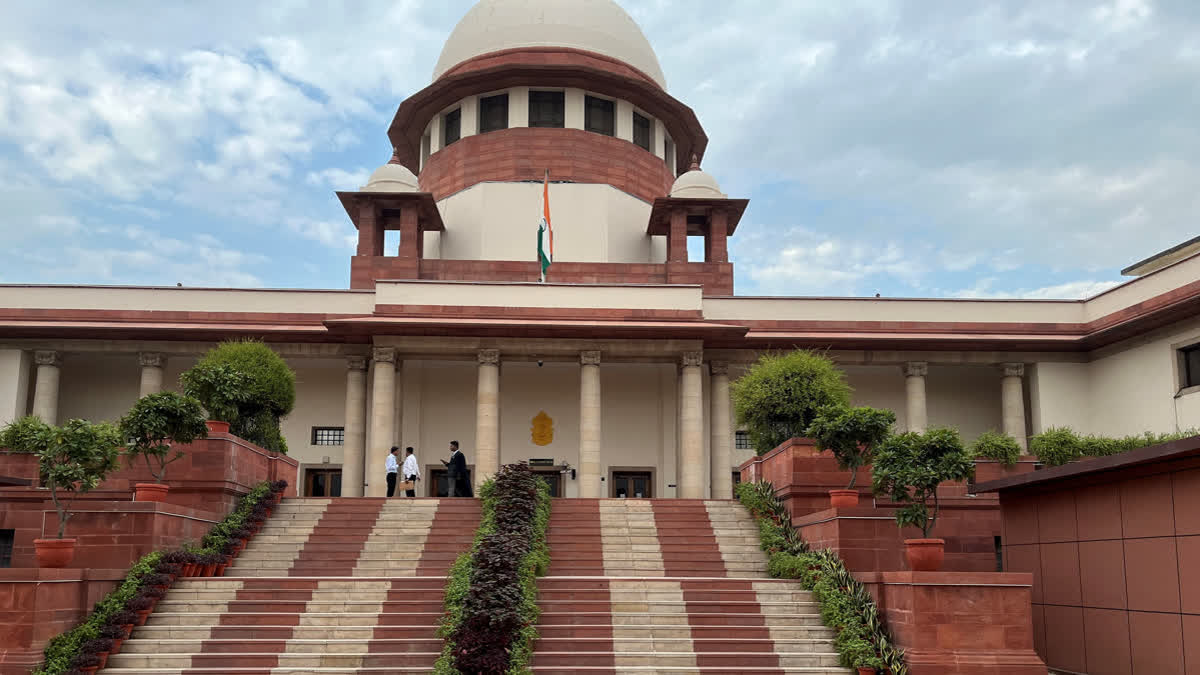New Delhi:In a significant ruling, the Supreme Court on Thursday declared that "the rules of the game" governing the selection to government jobs cannot be changed midway or after the process of recruitment starts unless the rules permit it.
The verdict was delivered by a bench led by Chief Justice of India DY Chandrachud and comprising Justices Hrishikesh Roy, PS Narasimha, Pankaj Mithal and Manoj Misra. The bench said “the rules of the game" for recruitment can't be changed mid-way through the selection process. The apex court made it clear that while the recruiting body can lay down separate benchmarks for different stages, it cannot change the criteria after that stage is over.
The bench said if a change is permissible under the extant rules or advertisement, the change would have to meet the requirement of Article 14 of the Constitution and satisfy the test of non-arbitrariness.
The bench emphasized that the recruiting bodies subject to the extant rules may formulate appropriate procedure to bring the recruitment process to a logical end. The apex court said that the procedure adopted for the process should be transparent and non-arbitrary. The detailed judgment will be uploaded later in the day.
A three-judge bench had referred the issue to the five-judge bench in the case Tej Prakash Pathak and others v. Rajasthan High Court and others (2013).
The apex court had doubted the correctness of an earlier decision K. Manjusree v. State of Andhra Pradesh and another (2008). In the 2008 decision, the apex court held that the selection criteria cannot be changed midway through the process as "it would amount to changing the rules of the game after the game was played which is impermissible".
The apex court said the recruitment process commences from the issuance of the advertisement calling for applications and ends with the filling up of vacancies.
The apex court said the eligibility criteria for being placed in the Select List, notified at the commencement of the recruitment process, cannot be changed midway through the recruitment process unless the extant rules so permit, or the advertisement, which is not contrary to the extant rules, so permit. “Even if such change is permissible under the extant Rules or the advertisement, the change would have to meet the requirement of Article 14 of the Constitution and satisfy the test of non-arbitrariness”, said the bench.
The apex court said recruiting bodies, subject to the extant rules, may devise appropriate procedures for bringing the recruitment process to its logical end provided the procedure so adopted is transparent, non-discriminatory/non-arbitrary and has a rational nexus to the object sought to be achieved.
The bench said the extant rules having statutory force are binding on the recruiting body both in terms of procedure and eligibility. “However, where the Rules are non-existent, or silent, administrative instructions may fill in the gaps”, it said.
“Placement in the select list gives no indefeasible right to appointment. The State or its instrumentality for bona fide reasons may choose not to fill up the vacancies. However, if vacancies exist, the State or its instrumentality cannot arbitrarily deny appointment to a person within the zone of consideration in the select list”, said the bench.
The apex court said the object of any process of selection for entry into public service is to ensure that a person most suitable for the post is selected and that what is suitable for one post may not be for the other.
The bench said a degree of discretion is necessary to be left to the employer to devise its method/ procedure to select a candidate most suitable for the post albeit subject to the overarching principles enshrined in Articles 14 and 16 of the Constitution as also the Rules/ Statute governing service and reservation.
The apex court said, in its view, the appointing authority/ recruiting authority/ competent authority, in the absence of Rules to the contrary, can devise a procedure for the selection of a candidate suitable for the post and while doing so it may also set benchmarks for different stages of the recruitment process including written examination and interview. “However, if any such benchmark is set, the same should be stipulated before the commencement of the recruitment process”, it said.
"But if the extant rules or the advertisement inviting application empowers the competent authority to set benchmarks at different stages of the recruitment process, then such benchmarks may be set any time before that stage is reached so that neither the candidates nor the evaluator/examiner/interviewer is taken by surprise," the bench said.
The apex court answered a question related to appointment criteria for government jobs referred to it by a three-judge bench in March 2013.
The matter was referred to the five-judge constitution bench by a three-judge bench in the case of 'Tej Prakash Pathak and others Vs Rajasthan High Court and others' (2013), which doubted the previous judgment in the case of K Manjusree Vs State of Andhra Pradesh and another (2008) that held the selection criteria cannot be changed midway.
In 2013, the three-judge bench had said it was a salutary principle not to permit the state or its instrumentalities to tinker with the 'rules of the game' insofar as the prescription of eligibility criteria was concerned.
Read More
- ‘No Error Apparent’, SC Junks Plea For Review Of Verdict Refusing To Direct Re-Exam Of NEET-UG 24
- Supreme Court Rules LMV Driving Licence Holder Can Drive Transport Vehicle Weighing Upto 7,500 Kg
